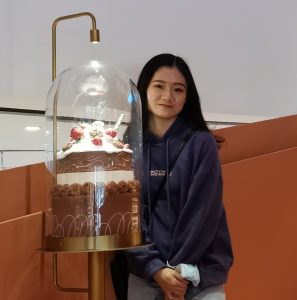While pursuing her master’s degree in psychology, Ran Duan’s supervisor posed a question to her: “Would you feel happier receiving praise from a superior compared to receiving praises from a lower status person? How about receiving criticism?”
“His words inspired me and my research,” recalls Duan, who is a graduate student at Shenzhen University working with Peng Li. “I thought about the question for several hours and then designed the experiment based on the literature review to find out.”
The results of that experiment, recently published in the Journal of Cognitive Neuroscience, confirm what many might suspect anecdotally – that people report feeling relatively happier receiving positive feedback from superiors – but goes a step further to show how brain activity patterns associated with processing the feedback predicted participants’ emotions.
Duan and colleagues had study participants do a stick drawing task while manipulating a social hierarchy to provide positive or negative evaluations to the subjects about their drawings. The researchers measured event-related potential (ERP) signals and also gathered behavioral data.
I spoke with Duan about this work, the study’s design, and next steps.
 CNS: What new insight were you seeking with this study:
CNS: What new insight were you seeking with this study:
Duan: Previous studies have demonstrated that social hierarchy influences human decisions and the reward processing. Some fMRI studies in particular have provided evidence that high status might improve the subject value of social rewards. However, we still don’t know how the social status of an evaluator influences feedback processing.
Intuitively, feedback from others is afforded greater or lesser weight depending on the status of the feedback provider, but this intuition has never been supported with experimentation. In addition, some studies have focused on the effect of social feedback in terms of approval or acceptance, without varying the social status of those providing the feedback. So, we intended to investigate how processing of performance evaluations is affected by the perceived social status of the evaluator.
CNS: Why did you use ERP measurements?
Duan: As far as we know, ERP technique has high temporal resolution and offers direct measurement of brain responses to external feedback and social rewards, which exactly meets our research needs. Moreover, the use of the ERP measurement was consistent with previous studies about feedback processing.
CNS: What were you most excited to find?
Duan: On the one hand, we found the superiors’ positive evaluations elicited a larger P3 component than other conditions, suggesting that high status specifically increased the subjective value of the rewards. We felt excited for the result because it confirmed our hypothesis.
CNS: Were there any novel elements to your study design that you would like to highlight and explain?
Duan: Yes, the stick drawing task is novel and original in our study. In previous studies, math quizzes and other tasks were used to establish social status. The main reason that we chose the stick drawing task over the kinds of math quizzes that have been used is because the math quizzes have objective, correct answers. In contrast, stick drawings can be evaluated subjectively. That is, any artwork, like the stick drawing used here, could be judged as good or bad depending on the taste of evaluators. Therefore, the present task was particularly suitable to investigate our research question.
CNS: What do you most want people to understand about this work?
Duan: Positive evaluations like praise from high-status individuals are especially rewarding, which has great significance for learning and teaching in daily life. For example, the praises from superior peers might encourage students better than from those with lower social status. For cognitive neuroscientists, we want to highlight that the P3 component in representing the affective and motivational significance of feedback could be evident in the trial-by-trial, brain-to-behavior relationship. Here, P3 amplitude was predictive of both happiness ratings and the speed of making happiness ratings, which may index participant certainty. Thus, P3 amplitude is linked to both the subjective value of a reward, as well as the participants’ certainty of the value of the reward.
CNS: What’s next for this line of work?
Duan: I want to test how the social status of evaluators influences feedback processing when participants are allowed to adjust their behavior. Our team is also interested in hyperscanning research. In the future, we can combine our project with the hyperscanning technique to investigate the interaction between evaluators and participants. There are many new fields we can explore.
-Lisa M.P. Munoz

Leave a Reply
You must be logged in to post a comment.